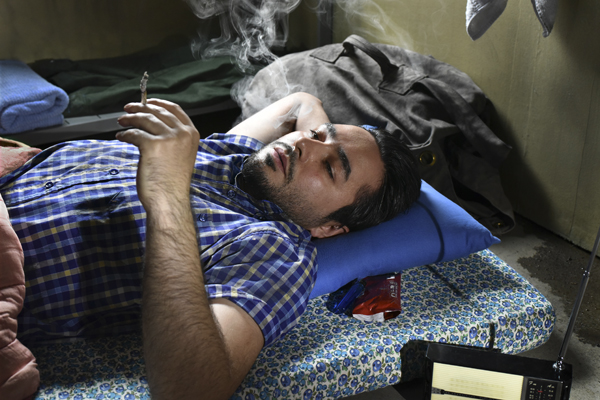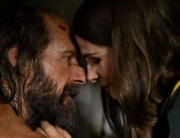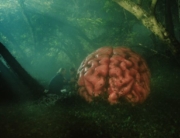A timely fable-like tale that intertwines the stories of a restaurant owner and a Middle Eastern refugee, The Other Side of Hope showcases the best of writer/director Aki Kaurismäki. With dry wit and an uncommon humanity, the Finnish auteur presents the second installment in his trilogy on the global refugee crisis that began in 2006 with Le Havre. Accessible and droll, and with his signature retro look and sensibility, The Other Side of Hope is a good introduction to the filmmaker’s style, one that has been an influence on Jim Jarmusch and other moviemakers.
First, middle-aged shirt salesman Wikström (Sakari Kuosmanen) packs a suitcase and wordlessly relinquishes his wedding ring to his wife. With packaged shirts in the back of his car, he sets out to meet with a longtime buyer (Kati Outinen) and learns that she, too, is ready for a change. With a stunning matter-of-fact wrongheadedness, she proclaims that she is moving to Mexico to “drink sake and dance hula hula.”
Betting all his money in a high-stakes poker game, Wikström collects a windfall and uses it to quit sales and reinvent himself as a restaurateur. The old-fashioned Golden Pint is available, complete with regular customers and quirky employees, due to the dodgy financial situation of the previous owner.
Meanwhile, a shipboard stowaway emerges from a heap of coal on arrival in Finland. Soot-covered Khaled (Sherwan Haji) then embarks on a bumpy course to obtain refugee status within a bureaucratic system, believing, as many do, that “Finland has equality for all.” Having lost most of his family in Syria in harrowing atrocities, he has crossed many borders to find his sister Miriam, who also fled to Europe, and, if possible, to obtain legal residence. The police station is his first stop, and he recites his route (Turkey, Greece, Hungary, Poland) in a rigorous interview. He befriends Mazdak (Simon Hussein Al-Bazoon), a displaced person from Iraq who advises him that he should feign cheerfulness, because “All melancholics are sent back.”
At the hearing, an official spokesman announces that there is no threat in Aleppo, Khaled’s hometown, and he is denied asylum and must be deported. Immediately afterwards, a television channel broadcasts the alarming news that a children’s hospital in that very city has been bombed. Khaled escapes and takes off in search of his sister, the only member of his family alive, but is beaten up by anti-immigration thugs on the prowl for trouble, who spew epithets at him.
Wikström comes across Khaled sleeping outside the restaurant in its garbage, and after a battle of wills (and fists) from masculine pride, offers him a job as a cleaning person at the Golden Pint. He also gives him a place to sleep in the empty storage unit that previously housed his shirt inventory. Soon the welcoming restaurant’s crew of misfits becomes a close-knit family and (no surprise coming from canine-lover Kaurismäki) adopts a dog and hides it, along with Khaled, from inspectors.
Suffusing the film is the director’s typical 1950s look, honed over the past 35 years through more than a dozen features, including highlights such as The Match Factory Girl and Man Without a Past. With a backdrop of twangy guitars and Finnish country music; nostalgic dress and mannerisms; along with vintage cars, a jukebox, a mechanical typewriter, the sense of another decade is conveyed. There is no mistaking it for the past, though—Khaled’s fingerprints are obtained digitally, and his fake ID is created with a hacker’s special equipment.
A bittersweet ending brings a touch of realism to Khaled’s travails as Wikström continues at the restaurant. Nevertheless, this entertaining and heartfelt film’s message, relayed without sentimentality, is that we all need each other and empathy rules the day.







Leave A Comment